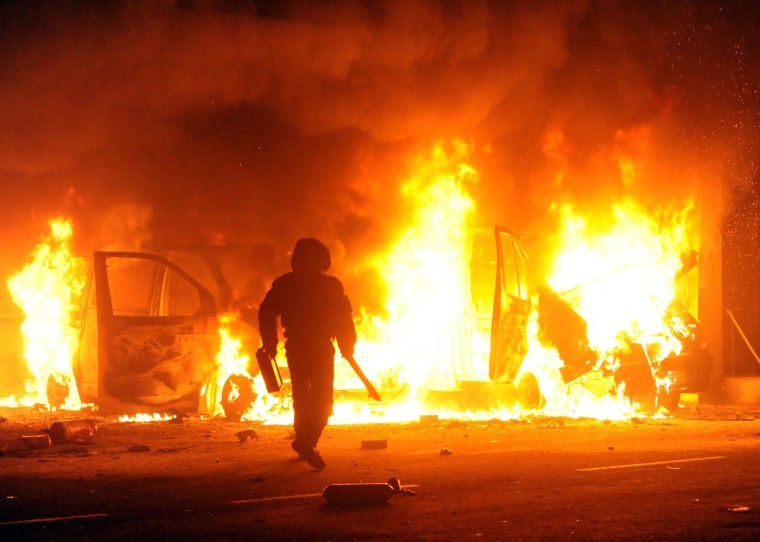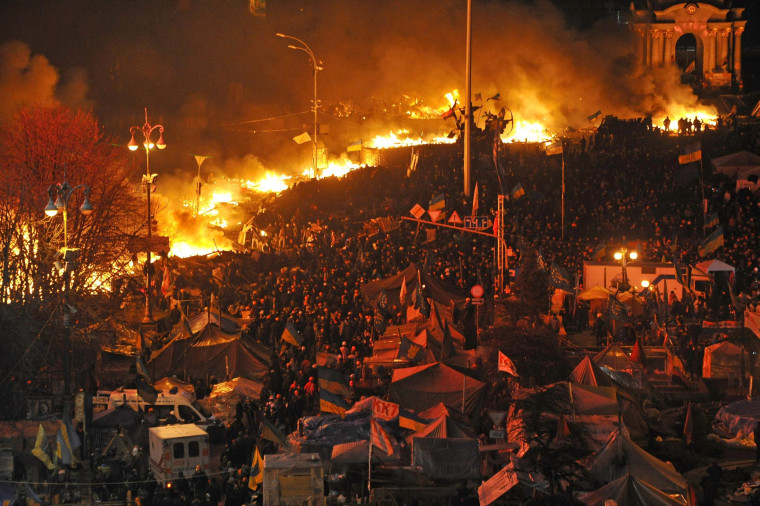The protests sweeping across Ukraine began last November when the government ditched a promised trade and political deal with the European Union in favor of closer ties with its old Soviet master.
Critics say Ukrainian President Viktor Yanukovych chose his allegiances under considerable pressure from Russia.
EU officials have accused Moscow of threatening to impose trade restrictions and holding a $15 billion bailout over Yanukovych in order to make him walk away from the deal, which was seen as a possible precursor to eventual EU membership.
Russia's reasons for exerting pressure on its smaller neighbor are deeply rooted in economics, history and culture.
Here are just a few:
1. Russia has designs on Ukraine’s natural gas pipelines
Gas has long been an explosive issue between Russia and Ukraine. Moscow is a key supplier of gas to the European Union, accounting for about a third of the region’s imports, about half of which flows through Ukrainian pipes.
Ukraine is also a major market for Russian gas, and arguments over how much it should pay have prompted Russia to turn off the taps, disrupting supplies to the rest of Europe.
Closer ties between the two countries would in theory at least give Russia more secure access to the former Soviet satellite's pipeline network and the European market.
2. Russia considers Ukraine a 'mini me'
Back in the days of the Russian Empire, the term “Little Russia” was commonly used for parts of modern-day Ukraine then under control of the Russian tsars.
Fast-forward nearly 100 years, and Russian President Vladimir Putin is still using the diminutive name. In 2009, Putin referred to Ukraine as “Little Russia” when quoting from the diaries of Anton Denikin, a commander for the White Army which fought against the Bolsheviks, suggesting Moscow’s attitude toward its neighbor was little changed.
"Ukraine" is derived from “at the edge” — in relation to Russia, of course — underlining Moscow’s view that Ukraine is no more than a vassalage.
3. Without Ukraine, there is no Eurasian Union
Putin once described the collapse of the Soviet Union as the “greatest geopolitical catastrophe"of the 20th century. That helps explain his drive to establish a Eurasian Union: A powerful economic and political bloc made up of like-minded former Soviet states with Russia at the center once again.
Ukraine is considered a key part of the plan because of its size, historical links with Russia and its position on the EU's frontier.
Earlier this month, the Ukrainian parliament approved a program to develop trade and economic relations with members of a customs union that includes Russia, Belarus and Kazakhstan, although whether it joins the group — seen as a precursor to the Eurasian Union —remains to be seen.

4. Russia believes Russian and Ukrainian history is inextricably linked
From the Russian point of view, Russia and Ukraine share deep historical and cultural roots. Kyiv, the capital of modern-day Ukraine, is considered the birthplace of orthodox Christianity and Russian civilization.
Kyiv was the center of a powerful civilization called Kievan Rus, a medieval federation of eastern Slavic tribes established in the 9th century, which preceded the nation states of Russia and Ukraine.
5. Russia considers Ukraine within its sphere of influence
The struggle between Russia and Britain for supremacy in Central Asia in the 19th century, known as the Great Game, provides some insight into Moscow’s attitude toward Ukraine in the 21st century.
Russia still views regional influence as a so-called zero-sum game, hence its determination to keep Ukraine within what Prime Minister Dmitri Medvedev has called Moscow's sphere of "privileged interests" — and out of the European Union’s.
6. Lots of Ukrainians still speak Russian
The divisions in Ukraine are as much political as they are linguistic. Ukrainian is the official language and is widely spoken in the north and west of the country, where most of the pro-European protesters hail from.
Russian is the native language for about a third of the population, mainly in the southern and eastern parts of the country, where a significant number of ethnic Russians live. They tend to be more sympathetic to policies aimed at bringing Ukraine and Russia closer together.
Part of the reason for the seeming intractability of Ukraine's crisis is that the country is split not only in its population, but also geography. The Dnepr River cuts it roughly in half between the western-looking parts of the country that fell under Russian domination only during World War II — and retain influences from the Austro-Hungarian Empire the once controlled them — and the eastern-looking parts that spent centuries under tsarist control.

7. Russia feels threatened by revolutions
Russia would like to see the current protests in the Ukraine brought to an end before disaffected Russians get ideas about taking to the streets. Given the region’s history of “color revolutions” over the past decade, it’s easy to understand why.
In November 2003, Georgia’s Rose Revolution led to the ouster of President Eduard Shevardnadze, who had ruled the former Soviet republic for 30 years. The following year, Ukraine's Orange Revolution reversed the results of a presidential election Yanukovych won.
In early 2005, protesters took to the streets in Kyrgyzstan in what became known as the Tulip Revolution, overthrowing President Askar Akayev and his government.
The Kremlin has accused western countries of backing the revolutions and threatening do the same in Russia in order to steal its vast energy rescources.
This story originally appeared on GlobalPost.
More stories from GlobalPost:
The Rise of the Hindu Fundamentalists
Wales Ponders Independence from Britain